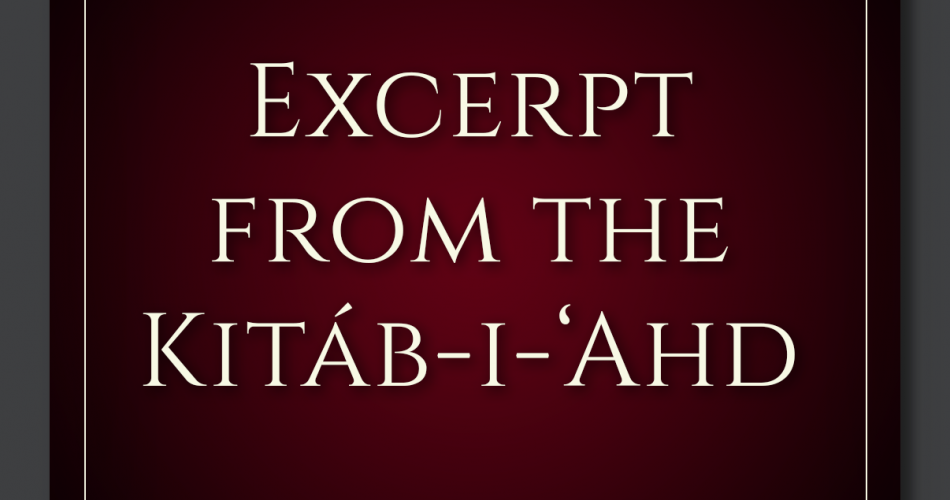The Will of the divine Testator is this: It is incumbent upon the Aghsán, the Afnán and My Kindred to turn, one and all, their faces towards the Most Mighty Branch. Consider that which We have revealed in Our Most Holy Book: “When the ocean of My presence hath ebbed and the Book of My Revelation is ended, turn your faces towards Him Whom God hath purposed, Who hath branched from this Ancient Root.
Bahá’u’lláh
وصيّت الله آنکه بايد اغصان و افنان و منتسبين طرّاً بغصنِ اعظم ناظر باشند اُنْظُرُوا إِلَى مَا أَنْزَلْنَاهُ فِي كِتَابِي الأَقْدَسِ إِذَا غِيضَ بَحْرُ الْوِصَالِ وَقُضِيَ كِتَابُ الْمَبْدَأِ فِي الْمَآلِ تَوَجَّهُوا إِلَى مَنْ أَرَادَهُ اللهُ الَّذِي انْشَعَبَ مِنْ هَذَا الأَصْلِ الْقَدِيم
حضرت بهاءالله
This is an excerpt from Baháʼuʼlláh’s Kitáb-i-ʻAhd, or “Book of the Covenant,” which served as His will and testament. This passage is especially significant in that Baháʼuʼlláh reiterates and emphasizes the appointment of ʻAbdu’l-Bahá as His successor. It is also our first selection which features a mixture of Persian and Arabic.
Regarding the Kitáb-i-ʻAhd, Shoghi Effendi has stated the following:
Written entirely in His own hand; unsealed, on the ninth day after His ascension in the presence of nine witnesses chosen from amongst His companions and members of His Family; read subsequently, on the afternoon of that same day, before a large company assembled in His Most Holy Tomb, including His sons, some of the Báb’s kinsmen, pilgrims and resident believers, this unique and epoch-making Document, designated by Bahá’u’lláh as His “Most Great Tablet,” and alluded to by Him as the “Crimson Book” in His “Epistle to the Son of the Wolf,” can find no parallel in the Scriptures of any previous Dispensation, not excluding that of the Báb Himself. For nowhere in the books pertaining to any of the world’s religious systems, not even among the writings of the Author of the Bábí Revelation, do we find any single document establishing a Covenant endowed with an authority comparable to the Covenant which Bahá’u’lláh had Himself instituted.
Shoghi Effendi, God Passes By
Original Sources
Further References

(Bahá’í Media Bank)
